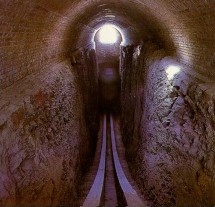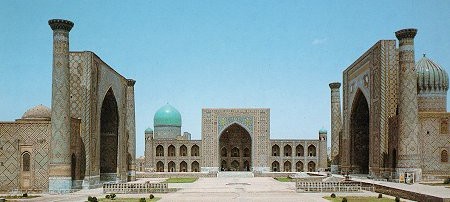
Only this part of the sextant and the foundation of Mirzo Ulug'bek Observatory in Samarkand have been preserved |
In fact, as noted by Heather Hobden, author of the book Ulughbek and His Observatory in Samarkand, Afghanistan could be very different today if the astronomer-prince had not been assassinated by Muslim extremists on October 27, 1449.
Center of learning. Ulug'bek's grandfather was the conqueror Tamerlane. His parents were Shah-Rukh and Gawhar-Shad, who had emerged victorious from the battle for Timur's empire earlier in the 15th century. They established their capital city -- Herat -- in the land that today is Afghanistan. Making it a center of culture and learning, they founded colleges -- known as madrassahs -- open to female as well as male students.
Living in Samarkand as Emir, or Prince, their son Ulug'bek founded madrassahs in Samarkand and Bukhara. The inscription still can be read today on Ulug'bek Madrassah built in Bukhara in 1417, "It is the duty of every Muslim man and woman to acquire knowledge."
Ulug'bek presided over a period of tremendous progress in the arts and sciences in his kingdom. As he was an architect, thinker, artist, scholar, scientist and astronomer, some American historians have likened Ulug'bek to a Thomas Jefferson of Uzbekistan.
One of the great observatories. Ulug'bek was most famous for his astronomical observatory built in the northern suburbs of Samarkand in 1428, and opened the following year by his mother Gawhar-Shad. The Madrassah in the Samarkand city square -- the Registan -- was decorated in the glazed tiles of that time in a sparkling pattern of stars.
The observatory was unsurpassed anywhere in the world, equipped as it was with the most modern instruments of the 15th century. The observatory -- 48 meters in diameter and 40 meters high -- was a large round building bisected north to south by a huge marble quadrant cut down deep into the ground for stability. The astronomical sights were moved into position on brass rails. The most accurate star tables up to that time were compiled at that site.
Samarkand became an important scientific center for much of the world, with its scholars influencing scientific thinking and work in many countries. Ulug'bek's observatory was a model for two famous Indian observatories of the 18th century in Jaipur and Delhi.
Assassinated by religious extremists. After Ulug'bek's father died, Ulug'bek ruled the empire. Unfortunately, the attention their new ruler paid to science irritated the religious extremists. They united under Hodja Ubaidulla Akrar, the leader of the Sufi Nakshbendi order. Akrar persuaded Ulug'bek's son Abd-al-Latif to overthrow his own father.
Ulug'bek was beheaded and his observatory was razed to the ground by the religious extremists. Fortunately, one of the observatory's astronomers, Ali-Kushji, managed to escape with his life and a copy of the star catalog that had been compiled by Ulug'bek. Ali-Kushji published the catalog. It was translated into several languages and used for at least two hundred years. From that work, Ulug'bek became recognized as one of the world's great astronomers.

Viceroy of India Lord George Curzon called Samarkand's Registan the world's best central city square |
In the centuries after Ulug'bek's death, the observatory site was lost and not rediscovered and restored until the late 20th century. In 1970, the excavated Samarkand observatory site was opened to the public. The underground portion of the observatory's enormous sextant readily catches the eye.
The sculptor of a memorial to Ulug'bek inscribed on it those words of the great astronomer that had particularly incensed the religious leaders, "Religion disperses like a fog, kingdoms perish, but the works of scholars remain for an eternity."
|
'Religion disperses like a fog, kingdoms perish, but the works of scholars remain for an eternity.' --Ulug'bek |
| To learn more about: | |||
|
Afghanistan
1. History timeline 2. Ethnic Distribution 3. CIA Factbook |
Samarkand
1. Samarkand 2. Samarkand 3. Samarkand 4. Samarkand 5. Pearl of the Orient |
Uzbekistan
1. Uzbekistan 2. Uzbekistan 3. History Of Islam in Uzbekistan 4. CIA Factbook |
Ulug'bek Observatory
1. Mirzo Ulug'bek 2. Observatory of Ulugh Beg 3. Heather Hobden space.com article 4. Book: Ulughbek and His Observatory in Samarkand by Heather Hobden published by The Cosmic Elk ISBN 1-871443-18-0 |
Islam
1. Brief Introduction to Islam 2. Islamic Supreme Council of America 3. IslamiCity 4. Revolutionary Association of Women of Afghanistan 5. Georgetown University Center for Muslim-Christian Understanding |